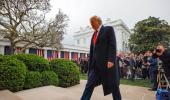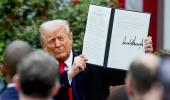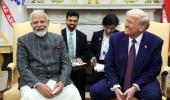Chinese President Xi Jinping on Wednesday pledged to strengthen the strategic relationships with neighbouring countries by 'appropriately' managing differences and enhancing supply chain ties as China's tariff war with the United States escalated.

In his first public speech after US President Donald Trump's steep global hike of tariffs, especially targeting China with 104 per cent on Chinese exports to America, Xi called for building a community with a shared future with neighbouring countries and striving to open new ground for China's neighbourhood work, state media reported.
Xi made the remarks at a central conference on work related to neighbouring countries, which was held in Beijing from Tuesday to Wednesday.
Trump's additional 50 per cent tariff, taking the overall levies against the Chinese exports to the US to 104 per cent, kicked in on Wednesday.
China vowed to fight to the end if Trump pursued the tariff measures.
External Affairs Minister S Jaishankar also said on Wednesday that India and China are moving towards a 'positive direction' in their ties and work needs to be done to normalise the relationship.
"I think we are moving in a positive direction," he said.
"It's obviously better than the last time I was here. I think the disengagement, particularly the Depsang-Demchok was important," Jaishankar said at the News 18 Rising Bharat Summit in New Delhi.
As its relations with the US became increasingly strained, China recently wound down border tensions with India and sought to improve its relations with other neighbours like Japan and South Korea, bracing for tough times under Trump's presidency on trade and strategic fronts.
India-China relations plunged to their lowest point since the 1962 war following the Galwan Valley clashes in 2020.
Following a series of diplomatic and military talks, the two sides withdrew their troops from several friction along the Line of Actual Control (LAC) in eastern Ladakh.
The ties showed signs of improvement after Xi met Prime Minister Narendra Modi at Kazan in Russia last October.
In October, the two sides also firmed up a disengagement pact for Depsang and Demchok, the last two friction points in eastern Ladakh.
Since then, the two countries have held a series of high-level meetings to normalise relations.
Jaishankar suggested that issues on the border remained to some extent because of the force build up over a period of years.
"But there were many other things which also happened during this period some of it was a collateral of the situation; some of it was actually a carryover from the Covid era. For example, our direct flights stopped during Covid, they were not resumed," he said.
"The Kailash Mansarovar Yatra stopped during Covid. It did not again resume. I think there is work to be done. We are at it," he said.
"We are sort of trying to see whether lot of this post-Covid and parallel to the border tension, the combination of these issues -- how much we can progress on this," Jaishankar added.
The external affairs minister said both sides are looking into these issues.
"We are looking at it because at the end of the day we have always maintained that the situation, which we saw between 2020 and 2024, was not in the interest of either country," he said.
"It was not in the interest of our relationship. And I think there is a recognition of that now," he added.
Last month, India and China explored ways to rebuild ties and agreed to initiate efforts to promote people-to-people exchanges, including arrangements for resumption of direct flights and resume Kailash Manasarovar Yatra this year.
In December NSA Ajit Doval travelled to Beijing and held talks with Foreign Minister Wang under the framework of Special Representatives (SR) dialogue on the boundary question.
In January, Foreign Secretary Vikram Misri visited Beijing and held talks with his Chinese counterpart Sun Weidong.
Recently, China held trade talks with South Korea and Japan, the first economic dialogue between the three countries in five years, to discuss regional trade facilitation as the countries braced for Trump's tariff announcement.
The trade ministers of the three countries discussed free trade agreements to promote regional and global trade.
China is also ramping up trade relations with several other countries in the neighbourhood under its Belt and Road Initiative (BRI).











 © 2025
© 2025